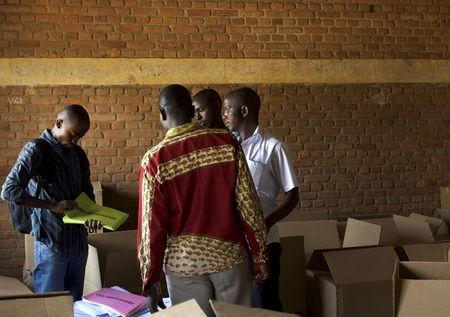Advertisement
Burundi votes in parliamentary poll amid opposition boycott
BUJUMBURA (Reuters) - Burundians voted for a new parliament on Monday after a night of sporadic blasts and gunshots, and weeks of violent protests against President Pierre Nkurunziza's decision to seek a third term in office.
Many polling stations opened late for the first in a series of elections boycotted by the opposition who say the president's move violates the constitution.
Despite mounting international criticism, the government has pressed on with the parliamentary vote and its plan for a presidential race on July 15, amid the deepest political crisis since an ethnically charged civil war ended in 2005.
The European Union said it was withdrawing its election observers from Burundi, saying a decision to go ahead with elections on Monday, without basic conditions to ensure their credibility, would only worsen the crisis in the country.
It said Burundi's decision to go ahead with the election, ignoring pleas to delay it, could also lead to a suspension of EU aid.
The EU said a month ago it had suspended its election observation mission but on Monday it said it had been forced to "definitely withdraw" the observers.
More than 125,000 people, or more than 1 percent of the nation's 10 million population, have fled across the border, causing worries in a region with a history of ethnic conflict, particularly next-door Rwanda which suffered genocide in 1994.
Sounds of shooting and at least two blasts were heard overnight in the capital Bujumbura, the focus of clashes between demonstrators and police. A witness reported one blast in Bujumbura's restive Musaga district on Monday morning.
The private Iwacu newspaper cited police on its website saying two grenades exploded in Mayuyu district about 25 km (15 miles) southeast of the capital, the latest in spate of such attacks in Burundi the past week or so that have killed four people and wounded dozens.
A police spokesman could not be reached for comment.
The president cites a court ruling saying he can run for a third term and has refused to back down, prompting opposition parties to say they would boycott all the polls.
Aimable Niyonkuru, 20, once a supporter of Nkurunziza's CNDD-FDD party, said he would not vote in Monday's vote for parliament and local councils because the president had not improved the economy or delivered on other promises.
"I am really disappointed about what all politicians are doing, I think that they are not patriotic," he said.
African states and Western donors had called for dialogue and a delay to voting, already pushed back several weeks due to the unrest, demanding the media was allowed to operate freely and other steps to ensure a fair vote.
The African Union said on Sunday it would not send observers as it did not believe voting would be free or fair. The United States and European Union nations have withheld some aid and threatened sanctions on those behind the violence.
The weeks of unrest that killed dozens of people has remained largely confined to the capital with only sporadic demonstrations in other urban centres.
Nkurunziza, who once led a rebel faction of the majority Hutu ethnic group against minority Tutsis during the civil war, has been counting mainly on his powerbase in rural regions.



















Add new comment